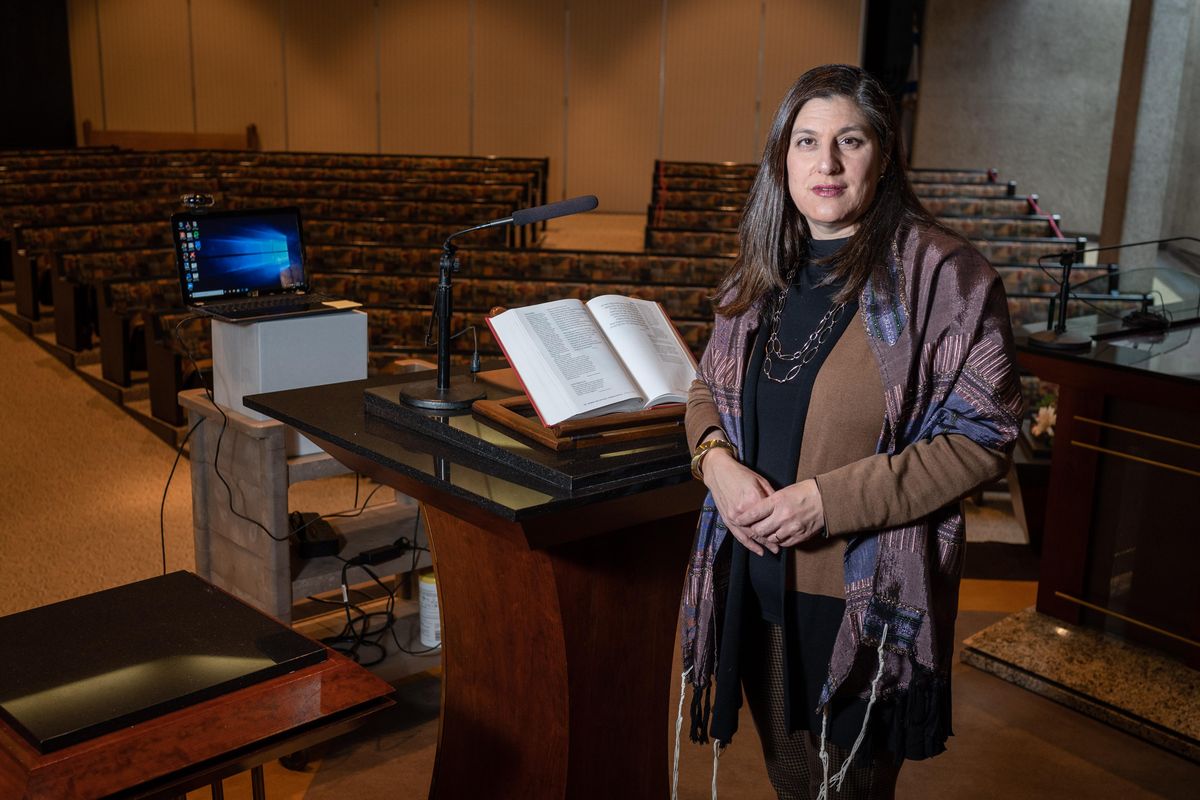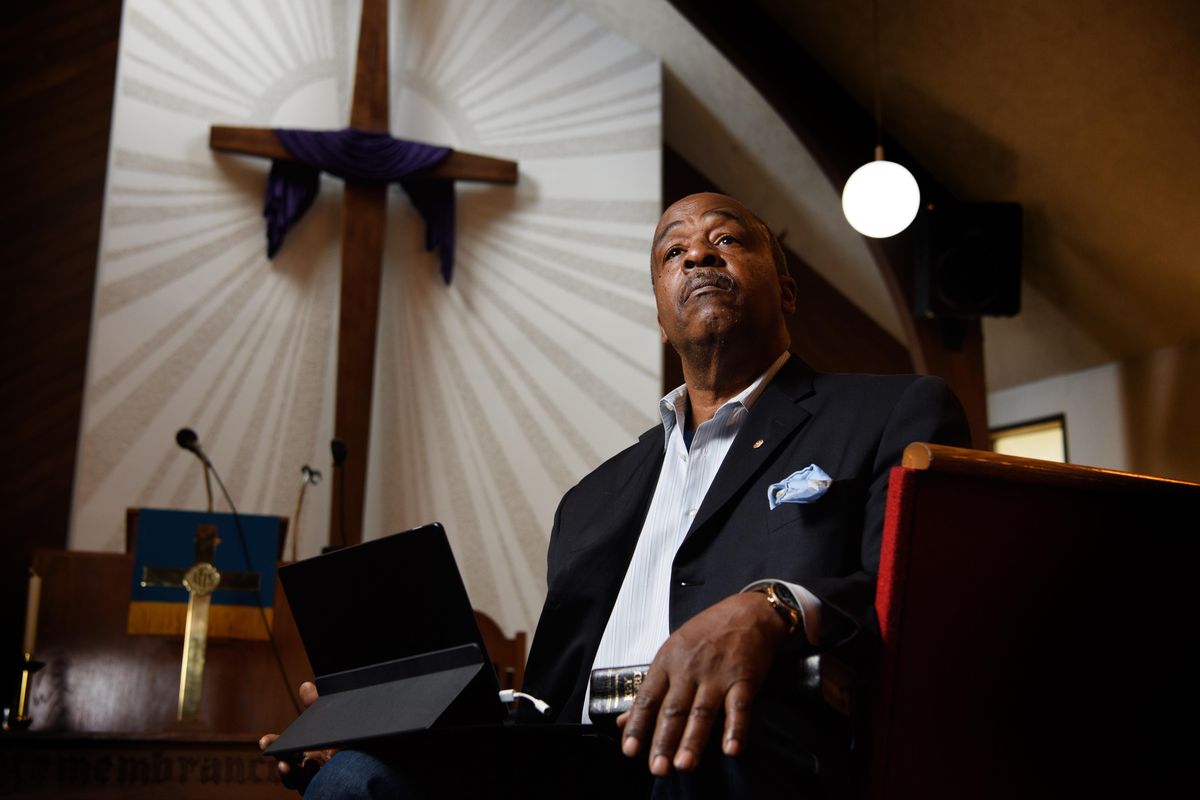‘An Easter unlike any other’: Local congregations prepare to celebrate Easter, Passover online and apart
Rev. Walter Kendricks of Morning Star Baptist Church poses for a photo with his Bible on one knee and the computer he will use to live-stream his Easter Sunday service to members on the other on Tuesday, April 7, 2020, at Morning Star Baptist Church in Spokane, Wash. (Tyler Tjomsland / The Spokesman-Review)Buy a print of this photo
The past few Sundays, the Rev. Walter Kendricks has preached to an empty sanctuary.
The sermon is livestreamed to his congregation, but streaming a service online has taken away from a comforting and familiar part of the African American churchgoing experience: call and response.
Kendricks said he misses the back-and-forth between him and the congregation at a normal Morning Star Baptist Church service, but as the church prepares to spend Easter in self-isolation to prevent the further spread of COVID-19, he said he looks toward the “heavenly realm” for a response.
“My job is just to get the message out there,” Kendricks said. “The response to it, I leave that up to God.”
Morning Star Baptist Church is one of hundreds of places of worship in the Inland Northwest finding ways to stay connected with parishioners during Passover, Holy Week and Easter while physically apart. Some church leaders are prerecording services and music, some are livestreaming and some are using video-calling services such as Skype or Zoom.
Pastors say the time apart has brought their congregations closer, and some hope the time at home will give families a moment to look inward, to their own faith, their family bonds and the meaning behind traditions.
Medium for the message
At Westminster Congregational Church, Easter is usually accompanied with fanfare, community and celebration. Andy CastroLang, Westminster’s pastor, plans to continue that tradition, though some of it will be mediated through a screen.
“It’s clunky, but it’s a lot better than no interaction, no opportunity to see or be seen,” she said.
CastroLang has been leading services from her guest bedroom, decorating the space around her with something festive, such as brightly colored fabric, candles or palm branches during Palm Sunday. The church normally holds an Easter breakfast on Sunday morning, a tradition CastroLang hopes to hold onto as well as using the teleconferencing software Zoom.
Zoom allows users to break large meetings into smaller meetings with fewer people, which CastroLang hopes will feel like sitting down at a table with other church members. Even if she does run into issues trying to throw a virtual Easter breakfast, she said she’s heard members of her congregation have been organizing meetings, holding virtual coffee hours and finding ways to check in on each other even when the church isn’t organizing it.
Rabbi Tamar Malino, who leads Temple Beth Shalom, has had to make significant changes to stay connected to her congregation.
For the past few weeks, Malino has set up a livestream in the sanctuary on Friday, which continuously broadcasts throughout Saturday so her congregation can turn it on the day before and still comply with the shabbat, or sabbath.
“Our whole world is evolving and changing in response to COVID-19, and religious communities are certainly no exception,” she said.
Malino said she isn’t as directly involved in the way individual members of the congregation celebrate Passover, which commemorates the Israelites’ liberation from slavery in ancient Egypt. But she has taught several Passover Seder dinner classes, because many in the community are leading the traditional meal on their own for the first time because they can’t have an intergenerational gathering or invite friends who may have led the meal for years.
Michael Wittwer, co-lead pastor for Life Center, said the church had discussed several ways to keep a sense of connectedness and normalcy for their congregation, such as encouraging the congregation to post a photo of their family in their Easter best. The church also has expanded Sunday school online in the hopes of providing activities and important learning for the many families that have children out of school.
Life Center also plans to incorporate videos made by members of the congregation in the church’s prerecorded services. Wittwer said many people in the church are connecting with each other and taking care of each other, but people still are isolated. He hopes that including as many members of the congregation in Easter service as possible will give the church a sense of community.
“It’s a way to make people feel seen,” he said. “People don’t feel seen right now. It’s like we’re all hiding away. It’s a way to really value people. These are the people that Jesus died for and was resurrected for.”
John Underhill, pastor of South Hill Bible Church, said his congregation has a similar practice under normal circumstances, asking individual members to share. It’s something they do whenever there is a fifth Sunday in a month and will continue while in isolation – over video.
Underhill said planning a church service mediated by technology is difficult, but he still plans for Easter to be a celebration and to focus on how Jesus can erase guilt, shame and fear, though during this time, he likely will focus on fear.
“It’s an Easter unlike any other,” he said.
Dayv Lounsbury, pastor of the Spokane Central Seventh-day Adventist Church, is planning to continue the church’s tradition of holding three services over Easter weekend, though they will be run by a skeleton crew and broadcast online. He said he hopes the services will maintain a sense of normalcy, as well as strengthen the bonds of those who are self-isolating together.
“We encourage it to be a family event,” Lounsbury said. “We acknowledge people may be in their kitchens and living rooms, their bedroom, on cellphones, on tablets, on computers, and we try to realize that the situation is very different.”
The congregation has found other ways to stay connected. Volunteers have worked to create care packages that include popcorn, toilet paper and Italian food to drop off at the homes of those who are quarantined or self-isolating because of age and medical conditions.
Lounsbury said the isolation is a reminder of the importance of strong family and church bonds, and that people should always care for one another.
“We shouldn’t reach out to our vulnerable people only in a crisis,” he said. “We should think of them and include them on a regular basis.”
Growing closer while apart
Kendricks, pastor of Morning Star Baptist Church, and a small group of deacons make 40 or more phone calls before every online church service. The calls are offers to help troubleshoot watching church online, but they’re also regular check-ins, to make sure everyone got through the week OK.
He has told them “we’re family, and families watch out for one another.”
“Even going back two or three years, I’ve always told them, ‘Pick up the phone and call somebody, if you haven’t seen someone in church, and if they cross your mind, that’s a prompting from the Holy Spirit,’ ” Kendricks said.
Kendricks is one of several pastors in the area encouraging people to continue to care for one another.
The Rt. Rev. Gretchen Rehberg, bishop of the Episcopal Diocese of Spokane, said the phone calls and an uptick in smaller, virtual meetings have led to fewer superficial interactions, such as small talk during coffee hour before church, and more intentional connection.
“When you can’t assume that somebody is OK because you saw them on Sunday, you actually have to reach out and connect,” Rehberg said. “That allows us to ask the questions, the deeper questions that sometimes are missing.”
Whether discussing the deeper meaning behind Easter and Christianity, or alleviating immediate needs like food and loneliness, the way the congregation interacts has changed, Rehberg said.
“How do we love our neighbor when we can’t be physically present?” she said. “We do that by very intentionally reaching out and supporting others, and also very intentionally allowing others to support us.”
This Passover will be the first time in years that Rabbi Yisroel Hahn of Chabad Spokane has celebrated with just his immediate family. He normally leads a community Passover to make sure everyone has a chance to celebrate. He anticipates many in the Jewish community will be in similar situations, celebrating with a small family gathering, or alone.
Hahn said he’s talked to hundreds around the country and that many are using self-isolation as a chance to focus on the deeper meaning behind the holiday: freedom from slavery and oppression. It’s also a chance to focus on internal faith. He said many are using it to pursue things they had been putting off for years.
“People are using this opportunity to look into themselves, do the things they always wanted but never had time,” he said.
Hahn sees the past few weeks as a chance to celebrate Passover and shabbat without distractions. He said those who aren’t practicing and don’t normally celebrate could use self-isolation as a way to connect with the people they love, put down technology for a day and focus on what really matters.
“In life, there are important things and there are urgent things,” he said. “The urgent things too many times push away the important things. Your job is an urgent thing, and spending time with your family is an important thing.”
Time to reflect internally
Liv Larson Andrews, pastor of Salem Lutheran Church, said the congregation normally has several large celebrations and that community is a big part of the church. She said celebrating Easter together isn’t an option, but there are still many ways people can recognize the significance of Christ’s death from their home, and look internally at their own faith.
“I really want to help people notice and find and celebrate and honor the sacred presence of God in their daily lives,” she said.
Though people need to self-isolate and limit their contact with people, Andrews said, they still can step outside, get fresh air and take a moment to worship by appreciating nature. She said she’s emphasized that worship isn’t confined to a building, that it can happen when a person is physically alone, with their family or outside.
“I’ve been wanting to point Christians to creation,” Andrews said.
“No, we can’t have trumpets and a sanctuary full of lilies, but we can be outside and we can look and notice the renewal of the earth. We can understand and notice God working and bearing life to us and the planet through creation.”
Bishop Thomas Daley of the Catholic Diocese of Spokane also emphasized that worship starts at home with the family, that there are things in most Catholic homes, like a crucifix, that can remind people of their faith and help them focus on Jesus.
“It’s so easy to associate church with the time you gather, the time you come to Mass on Sunday or Saturday nights,” he said, “So we’re asking you to rediscover what’s in your home, what keeps your faith continuing throughout the week.”
Daley said many have experienced a longer than normal Lent, facing fear, uncertainty and going without the things and connections to which they are accustomed. He urged parishioners to do what they can, to watch Mass on Sunday from home and to focus on the constants of faith, Jesus as the savior and the resurrection itself.
“There’s two messages needed during this time: healing and hope,” Daley said. “I always tell priests that hope is not optimism. Optimism is wishful thinking. Often times, it’s not real. Hope is reality-grounded in faith. The reality is that this is a difficult time. It’s a time of sickness, fear and even death. That’s the reality. But grounded in faith is Jesus is our savior – and we believe that.”


